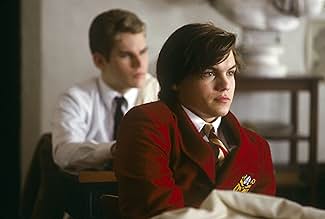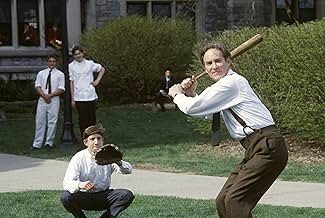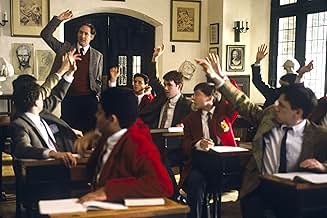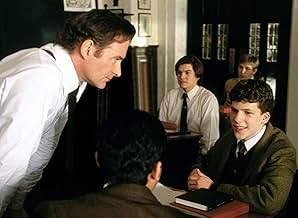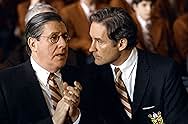VALUTAZIONE IMDb
6,9/10
18.281
LA TUA VALUTAZIONE
Un idealista insegnante di scuola elementare tenta di riscattare uno studente incorreggibile.Un idealista insegnante di scuola elementare tenta di riscattare uno studente incorreggibile.Un idealista insegnante di scuola elementare tenta di riscattare uno studente incorreggibile.
- Premi
- 2 candidature totali
Gabriel Millman
- Robert Brewster
- (as Gabe Millman)
Recensioni in evidenza
The movie deals with a good and idealist teacher (Kevin Kline) of Roman classic history and his relationship to a roguish and rebel pupil (Emile Hirsch) in a high class school . The teacher tries to redeem him but the continuous challenge makes that the incorrigible student (besides , being senator's son : Harris Yulin) results to be more and less difficult or impossible to dominate him . Meanwhile , the starring falls in love with an attractive , though married teacher (Embeth Davidtz) , and has problems with the college director (Edward Herrmann).
The picture is based on Ethan Canin's book titled ¨ Palace thief ¨. The story is narrated with sensitivity and intelligence and here are treated ethic and moral issues developed in great sense of ductility and fairness . As the teacher will have to face on the complex truth that can be manipulated or phony . The motion picture takes part of the School Sub-genre , whose maxim representation turns out to be the prestigious ¨Dead poet society¨ by Peter Weir . The film is displayed throughout among past and present time where we find the same characters though twenty five years later , except Kevin Kline the actors are different . The actors' interpretation is excellent , such as Kevin Kline as a mature and upright teacher who hands perfectly the role , Emile Hirsch as the rascal young is top-notch as well as Embeth Davidtz who is wonderful and enjoyable . James Newton Howard's musical score is sensitive and touching . The story was well directed by Michael Hoffman . Rating : Above average , well worth watching.
The picture is based on Ethan Canin's book titled ¨ Palace thief ¨. The story is narrated with sensitivity and intelligence and here are treated ethic and moral issues developed in great sense of ductility and fairness . As the teacher will have to face on the complex truth that can be manipulated or phony . The motion picture takes part of the School Sub-genre , whose maxim representation turns out to be the prestigious ¨Dead poet society¨ by Peter Weir . The film is displayed throughout among past and present time where we find the same characters though twenty five years later , except Kevin Kline the actors are different . The actors' interpretation is excellent , such as Kevin Kline as a mature and upright teacher who hands perfectly the role , Emile Hirsch as the rascal young is top-notch as well as Embeth Davidtz who is wonderful and enjoyable . James Newton Howard's musical score is sensitive and touching . The story was well directed by Michael Hoffman . Rating : Above average , well worth watching.
From `Goodbye Mr. Chips' in the 1930's to `Dead Poet's Society' in the 1980's, the movies have had a long-running love affair with inspirational, sentimental stories set at ivy-covered, collegiate-gothic, all-male prep schools. These films inevitably center around a beloved teacher and the lifelong bond he forges with his devoted students.
The latest addition to the genre a successful one is `The Emperor's Club,' with Kevin Kline assuming the role of the teacher who considers it his duty not only to instruct his students in the details of classical history but to mold them into men of integrity and character in the process. `The Emperor's Club' follows the standard formula up to a point. William Hundert is the most highly respected faculty member at St. Benedict's Academy. He is able to bring the history of the ancient Greeks and Romans to vivid life for his admittedly highly motivated young charges. Then, one day, into his classroom strides Sedgwick Bell, a bright, highly unmotivated student who would rather mock the stuffiness of education and inspire his buddies to feats of rabblerousing than devote his life to the serious pursuit of academia. It, thus, becomes Hundert's job to turn Sedgwick around, a feat that always seems much easier to accomplish in the movies than it ever is in real life.
`The Emperor's Club,' after its rather conventional beginning, deviates from its predecessors in one key respect: Hundert, though a man of values and integrity, is not above compromise himself, and he winds up making a very serious one, the ramifications of which he has to live with for many years to come. Rather than showing him as some sort of saintly figure, screenwriter Neil Tolkin (working from a short story by Ethan Canin) and director Michael Hoffman allow Hundert's humanity to shine through. He is a flawed individual who permits personal feelings to cloud his judgments and who is willing, once he has created a problem, to allow the truth of his own guilt to remain hidden even when innocent victims suffer as a result of his actions. `The Emperor's Club' is also notable for its clear-eyed recognition that not all situations in life need have a satisfying resolution, that some people simply do not acknowledge their own failings and, therefore, never develop into morally superior people no matter how many experiences life throws at them. Yet, what breaks Hundert's heart is the recognition he comes to that such a person is often times more highly rewarded by the world than the man who follows along the straight-and-narrow path all his life.
Kline gives a superb performance as Hundert, capturing the quiet dignity, understated passion and conflicted conscience of a man who loves his boys and who tries to do the right thing but who, like the rest of us, doesn't always succeed in doing so. Emile Hirsch is also excellent as young Sedgwick, the boy whose need for attention and lack of moral guidance from his father lead him to accept the winning-at-all-cost philosophy to get him through life.
`The Emperor's Club,' despite having its roots firmly planted in a grand storytelling tradition, still manages to take us into new territory from time to time and its recognition of the importance of education and academics (we actually get to learn a little about Roman history while watching the movie) makes it virtually unique among films of its time.
The latest addition to the genre a successful one is `The Emperor's Club,' with Kevin Kline assuming the role of the teacher who considers it his duty not only to instruct his students in the details of classical history but to mold them into men of integrity and character in the process. `The Emperor's Club' follows the standard formula up to a point. William Hundert is the most highly respected faculty member at St. Benedict's Academy. He is able to bring the history of the ancient Greeks and Romans to vivid life for his admittedly highly motivated young charges. Then, one day, into his classroom strides Sedgwick Bell, a bright, highly unmotivated student who would rather mock the stuffiness of education and inspire his buddies to feats of rabblerousing than devote his life to the serious pursuit of academia. It, thus, becomes Hundert's job to turn Sedgwick around, a feat that always seems much easier to accomplish in the movies than it ever is in real life.
`The Emperor's Club,' after its rather conventional beginning, deviates from its predecessors in one key respect: Hundert, though a man of values and integrity, is not above compromise himself, and he winds up making a very serious one, the ramifications of which he has to live with for many years to come. Rather than showing him as some sort of saintly figure, screenwriter Neil Tolkin (working from a short story by Ethan Canin) and director Michael Hoffman allow Hundert's humanity to shine through. He is a flawed individual who permits personal feelings to cloud his judgments and who is willing, once he has created a problem, to allow the truth of his own guilt to remain hidden even when innocent victims suffer as a result of his actions. `The Emperor's Club' is also notable for its clear-eyed recognition that not all situations in life need have a satisfying resolution, that some people simply do not acknowledge their own failings and, therefore, never develop into morally superior people no matter how many experiences life throws at them. Yet, what breaks Hundert's heart is the recognition he comes to that such a person is often times more highly rewarded by the world than the man who follows along the straight-and-narrow path all his life.
Kline gives a superb performance as Hundert, capturing the quiet dignity, understated passion and conflicted conscience of a man who loves his boys and who tries to do the right thing but who, like the rest of us, doesn't always succeed in doing so. Emile Hirsch is also excellent as young Sedgwick, the boy whose need for attention and lack of moral guidance from his father lead him to accept the winning-at-all-cost philosophy to get him through life.
`The Emperor's Club,' despite having its roots firmly planted in a grand storytelling tradition, still manages to take us into new territory from time to time and its recognition of the importance of education and academics (we actually get to learn a little about Roman history while watching the movie) makes it virtually unique among films of its time.
I thoroughly enjoyed this movie. I don't care if others think it was predictable - so what? Wasn't Jaws predictable? How about Alien? Once in a while a movie has a lesson in it - like this one. Even if it is a lesson that gets played over and over.
I really didn't care for the mildly romantic banter between Kline's character and his female interest. Maybe the purpose of the character was to show Dr. Hundert was not gay - but that seems awfully shallow to me. If this movie was not about a gay teacher, why did the writer feel obligate to prove the reverse? All in all though, this was a GOOD movie - very good.
I really didn't care for the mildly romantic banter between Kline's character and his female interest. Maybe the purpose of the character was to show Dr. Hundert was not gay - but that seems awfully shallow to me. If this movie was not about a gay teacher, why did the writer feel obligate to prove the reverse? All in all though, this was a GOOD movie - very good.
I can see exactly why comparisons to Dead Poets' Society abound. Having attended boarding school and developed an irrational attachment to that film at the time, I have since discarded it like an overworn leisure suit, and tried to move on to more interesting fare. But honestly, this film made me think -- in all the ways that school should have, and the DPSociety didn't even try to.
Robin Williams has never starred in a thinking man's film, which is why, in the end, the comparison between the two movies doesn't hold up. To get The Emperor's Club, you have to actually grasp why someone might be inspired by history -- by a time when men could truly fail, or conquer, or establish a foothold in eternity. The fact that we know Socrates existed is astounding. It is luck. If James Carville goes down in history it will be an accident, if a likely one. The point of this film is that difference -- the difference between men whose character demands to be remembered, and men whose character demands to be forgotten. It is also the story of two systems of reward and recognition -- one that produced Plato and one that produced Jerry Springer. That is why we study history, as the movie says. To learn from and be inspired by the great leaders who came before us, and to overcome the moral mediocrity of the modern world.
But, as the film concludes, great men are no longer chosen to lead. The Emperor's Club, while cloaked in the guise of a charming elitist flick, is actually a tale of profound disappointment and disillusionment regarding human society. The few great men who are left exist in the shadows, while the ignorant grandstanders wield political power. We elect them; we are in their hands. And it is all because of a lack of awareness, a lack of knowledge, and a lack of history. People don't vote for principle -- they vote for rhetoric. And it shows.
I was not expecting too much from this movie, other than the always pleasurable experience of watching Kevin Kline. But, wrapped up in the sentimental moralizing, there was the story of a great man doing the only great thing left: trying to bring others out the darkness. His success or failure is as immaterial as the execution of Socrates -- it really is the thought that counts.
Robin Williams has never starred in a thinking man's film, which is why, in the end, the comparison between the two movies doesn't hold up. To get The Emperor's Club, you have to actually grasp why someone might be inspired by history -- by a time when men could truly fail, or conquer, or establish a foothold in eternity. The fact that we know Socrates existed is astounding. It is luck. If James Carville goes down in history it will be an accident, if a likely one. The point of this film is that difference -- the difference between men whose character demands to be remembered, and men whose character demands to be forgotten. It is also the story of two systems of reward and recognition -- one that produced Plato and one that produced Jerry Springer. That is why we study history, as the movie says. To learn from and be inspired by the great leaders who came before us, and to overcome the moral mediocrity of the modern world.
But, as the film concludes, great men are no longer chosen to lead. The Emperor's Club, while cloaked in the guise of a charming elitist flick, is actually a tale of profound disappointment and disillusionment regarding human society. The few great men who are left exist in the shadows, while the ignorant grandstanders wield political power. We elect them; we are in their hands. And it is all because of a lack of awareness, a lack of knowledge, and a lack of history. People don't vote for principle -- they vote for rhetoric. And it shows.
I was not expecting too much from this movie, other than the always pleasurable experience of watching Kevin Kline. But, wrapped up in the sentimental moralizing, there was the story of a great man doing the only great thing left: trying to bring others out the darkness. His success or failure is as immaterial as the execution of Socrates -- it really is the thought that counts.
There is no doubt that Kevin Kline is both a funny man and a fine comedic actor. However, as he has proved yet again, anything other than dramatic roles is a waste of his acting talent.
In the finest film he has made, he is superb in his role as school teacher and mentor to a generation of boys -- including one particular bad egg.
Excellently cast, scripted and acted, this is a must see.
In the finest film he has made, he is superb in his role as school teacher and mentor to a generation of boys -- including one particular bad egg.
Excellently cast, scripted and acted, this is a must see.
Lo sapevi?
- QuizWhen filming the movie, the location (Emma Willard school in Troy, NY) was still operating as a girl's school. Emile Hirsch reportedly complained about the students, claiming that they were pestering him for his phone number. He also (reportedly) said some unsavory things about the school in general. When the students heard about this, they demanded an apology from Hirsch, which he delivered in front of the entire student body. At the school viewing, whenever he appeared on screen, the girls booed loudly and stories about him still circulate through the student body.
- BlooperWhen the girls are removing their shirts to go skinny-dipping, a Victoria's Secret Body by Victoria bra is revealed. That bra is from the time the film was made, not the mid-1970s when the scene takes place.
- Citazioni
William Hundert: As a great Aristophanes once wrote-- roughly translated-- "Youth ages, immaturity is outgrown. Ignorance can be educated and drunkenness sobered, but stupid... lasts forever."
- Colonne sonoreFunk 49
Written by Jim Fox, Joe Walsh, and Dale Peters
Performed by James Gang
Courtesy of MCA Records
Under license from Universal Music Enterprises
I più visti
Accedi per valutare e creare un elenco di titoli salvati per ottenere consigli personalizzati
- How long is The Emperor's Club?Powered by Alexa
Dettagli
- Data di uscita
- Paese di origine
- Lingua
- Celebre anche come
- The Emperor's Club
- Luoghi delle riprese
- Aziende produttrici
- Vedi altri crediti dell’azienda su IMDbPro
Botteghino
- Budget
- 12.500.000 USD (previsto)
- Lordo Stati Uniti e Canada
- 14.118.751 USD
- Fine settimana di apertura Stati Uniti e Canada
- 3.846.780 USD
- 24 nov 2002
- Lordo in tutto il mondo
- 16.318.449 USD
- Tempo di esecuzione
- 1h 49min(109 min)
- Colore
- Mix di suoni
- Proporzioni
- 1.85 : 1
Contribuisci a questa pagina
Suggerisci una modifica o aggiungi i contenuti mancanti



